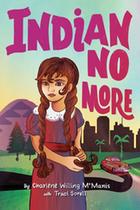
In August 1954, President Eisenhower signs a law that says Umpqua Regina Petit and the other citizens of her tribe living on the Grand Ronde Indian Reservation in Oregon are "no longer Indian." Though her Chich (grandmother) urges Regina's father to fight, in 1957 he signs up for the Indian Relocation Program: "Daddy called it an opportunity... Chich called it an eviction." The program moves the family to Los Angeles, where Regina interacts with non-Native neighbors and classmates for the first time. Mama says Regina is still Umpqua even if they leave the reservation, but new friends Keith and Addie are baffled that her family doesn't fit the stereotypes they've seen on TV: "What kind of Indians are you? Do you even have a tipi?"
Extensive back matter informs the reader that Indian No More is based on the experiences of debut author Charlene Willing McManis's family. Like Regina, Willing McManis was Umpqua and a member of the Confederated Tribes of Grand Ronde; after her death, the book was completed by Sorell, a citizen of the Cherokee Nation, with the continued help of editor and fellow Cherokee Elise McMullen-Ciotti. Additional paratextual materials include a glossary of Chinuk Wawa (the language of the Confederated Tribes of Grand Ronde) words and a note that explains why the term "Indian" is used throughout the book: it was the "prevailing word" in the 1950s. A heartfelt and meditative exploration of an often-undiscussed time in recent U.S. history, Indian No More wades through complex issues of identity and culture and the preservation of both. Thoughtful and purposeful in its education of readers, McManis and Sorell's collaboration sits proudly within the pantheon of middle-grade books as one fully written and edited by women of the Native Nations. --Kyla Paterno, freelance reviewer

